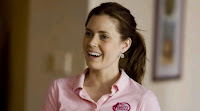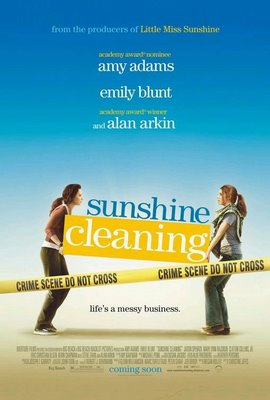
Sunshine Cleaning: Ripley’s Pick or Ripley’s Rebuke?
This is a film I wanted to love. It’s directed by a woman (Christine Jeffs). It’s written by a woman (Megan Holley). It stars two brilliant actors (Amy Adams and Emily Blunt), not to mention one of my favorite indie-actors, who co-stars (Mary Lynn Rajskub). And for the most part, I liked it. For the most part.
Amy Adams plays Rose, a single mother with a troubled son who gets expelled from his elementary school. In order to send him to private school, she realizes her job cleaning houses won’t come close to covering the cost, so she gets the idea from Mac, the cop she’s having an affair with (her ex-boyfriend from high school, played by Steve Zahn) to start a biohazard crime-scene cleaning service. Her younger sister Norah (Emily Blunt), a darker, edgier, gothier version of Rose, goes into business with Rose after getting fired from her job as a server at a diner. Hilarity ensues. Sort of.
It’s a comedy in the sense that funny things happen, lots of bloody, yucky grossness, some witty quips from the girls’ father Joe (Alan Arkin), as well as the smile-inducing precocio usness of Rose’s son Oscar (Jason Spevack). But we quickly learn there’s some serious darkness underlying the played-for-laughs desperation: Norah and Rose’s mother committed suicide when they were young girls. That added dynamic always keeps things from veering too far into clever-indie-comedy territory but sometimes forces it a little too far into brooding-melodramatic-indie-drama territory (with a little splash of Hollywood thrown in).
usness of Rose’s son Oscar (Jason Spevack). But we quickly learn there’s some serious darkness underlying the played-for-laughs desperation: Norah and Rose’s mother committed suicide when they were young girls. That added dynamic always keeps things from veering too far into clever-indie-comedy territory but sometimes forces it a little too far into brooding-melodramatic-indie-drama territory (with a little splash of Hollywood thrown in).
So it goes like this: two sisters love and support each other in typical love-hate siblinghood-rivalry interactions, with the older sister taking on the grown-up role (however superficial it actually is—she repeats daily affirmations in her bathroom mirror for god’s sake) and the younger sister taking on the needy, irresponsible, screws-everything-up role. I enjoyed watching a movie about two insecure women with mother issues; as much as I see films and TV shows and music videos and bar brawls and daytime talk show interviews about insecure men with father issues, this was a much needed change.
The best things about this movie revolve around that sibling bond and how they managed to ma ke it through their childhoods without a mother by doing their best to take care of each other. But the whole “our mom died and ruined our lives and now we literally clean up the messes made by dead people” metaphor got slightly heavy-handed after awhile. And, as much as I hate to say it, I didn’t necessarily like that Rose’s motivation to change her life was spurred by her motherly duty to get her son a darn good education. (I’m an asshole.) About halfway through, I began to question if this movie even liked women.
ke it through their childhoods without a mother by doing their best to take care of each other. But the whole “our mom died and ruined our lives and now we literally clean up the messes made by dead people” metaphor got slightly heavy-handed after awhile. And, as much as I hate to say it, I didn’t necessarily like that Rose’s motivation to change her life was spurred by her motherly duty to get her son a darn good education. (I’m an asshole.) About halfway through, I began to question if this movie even liked women.
One scene in particular bothered me. Rose happens to run into Mac’s wife at a gas station, and even though Rose tries to avoid her, his wife confronts her anyway, making it very clear that she knows about Rose’s affair with Mac. She says something along the lines of, “I know what you’re doing.” And then, “He chose me.” It isn’t lost on the viewer that Mac’s wife is pregnant, and for a moment, as much as I had admired Rose and her determination in the beginning, I suddenly despised her.
I wanted this movie to not play into that stereotype, you know, the one about women always competing with one another for men and getting all vicious with their “keep your hands off my man” talk and never dealing with the real issue: the fact that it’s their man who’s fucking other women in the first place. (This stereotype is yet another, more subtle example of the man-child in film; by women placing blame solely on other women for their partner’s infidelity, it plays into the “boys will be boys” mode of thinking—he can’t help it, because he’s a man and therefore can’t control himself poor thing, but you, as a woman, and consequently the entire world’s moral compass, should know better.)
On the other hand, I admire the film for acknowledging how horribly women can  sometimes act toward one another. I’d almost say it’s one of the movie’s themes. The only time Rose feels the need to apologize for how her life turned out, for secretly fucking her married ex-high-school-quarterback-boyfriend, for being a single mother, for cleaning other people’s houses for a living, occurs when she fears being judged by other women, most notably when an old high school friend invites her to a baby shower, where she’ll undoubtedly see many of the women who knew her in high school as the gorgeous, envy-inducing captain of the cheerleading squad.
sometimes act toward one another. I’d almost say it’s one of the movie’s themes. The only time Rose feels the need to apologize for how her life turned out, for secretly fucking her married ex-high-school-quarterback-boyfriend, for being a single mother, for cleaning other people’s houses for a living, occurs when she fears being judged by other women, most notably when an old high school friend invites her to a baby shower, where she’ll undoubtedly see many of the women who knew her in high school as the gorgeous, envy-inducing captain of the cheerleading squad.
However, I can’t figure out if the film is deliberate in its portrayal of female interactions, and attempting to make a statement about society’s ridiculous portrayal of them (think faux-Angelina Jolie/Jen Aniston rivalry and, more recently, faux-Kara DioGuardi/Paula Abdul rivalry), or if it’s merely validating the dominant ideology that there isn’t much female sisterhood or solidarity outside of actual sibling relationships. As a feminist, I know that not to be the case, but as a feminist critiquing this film, I ultimately left the theater feeling disappointed.
 I expected more from a film about women’s experiences, especially when that film is written and directed by women. I know from reading other reviews of Sunshine Cleaning that many feminist women adored the movie, if only for the fact that it’s women-centered, which is something we certainly don’t see enough of in mainstream (and even indie) cinema. And we should definitely do as much as we can to support women filmmakers, given how few of them exist. But I don’t feel content leaving it at that. It was a decent movie. We can do better.
I expected more from a film about women’s experiences, especially when that film is written and directed by women. I know from reading other reviews of Sunshine Cleaning that many feminist women adored the movie, if only for the fact that it’s women-centered, which is something we certainly don’t see enough of in mainstream (and even indie) cinema. And we should definitely do as much as we can to support women filmmakers, given how few of them exist. But I don’t feel content leaving it at that. It was a decent movie. We can do better.
